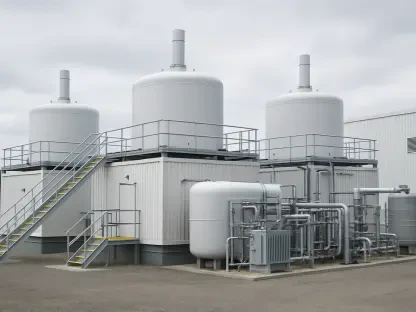The pursuit of a sustainable future in the UK has come with a staggering price tag, as electricity costs spiral upward under the weight of ambitious Net Zero policies. These initiatives, designed to transition the nation to a renewables-based energy grid, are increasingly tied to what experts call “non-commodity costs”—expenses not related to power generation itself but to managing an unreliable, weather-dependent system. This hidden burden is reshaping the financial landscape for both households and industries, casting a shadow over the promise of green energy.
Reports highlight a grim reality: these non-commodity costs are already adding billions to annual electricity bills, with projections indicating a sharp escalation in the coming years. The financial strain is not just a household concern but a national one, threatening the UK’s competitiveness on the global stage. As industrial energy prices soar to the highest levels in the developed world, there is growing alarm about the sustainability of current policies and their broader economic fallout.
Context and Importance of the Energy Cost Crisis
The UK’s commitment to achieving Net Zero emissions by 2050 stands as a cornerstone of its environmental strategy, aiming to curb climate change through a rapid shift to renewable energy sources like wind and solar. This transition, while admirable in intent, has introduced complex challenges in maintaining a stable and affordable energy supply. The policies underpinning this shift have reshaped the energy market, prioritizing green technologies over traditional fossil fuel systems.
The significance of this issue cannot be overstated, as rising electricity costs directly fuel the cost-of-living crisis gripping the nation. Households face mounting bills, while businesses grapple with diminished profitability due to exorbitant industrial energy prices. Beyond individual impacts, the crisis jeopardizes broader economic stability, raising questions about whether environmental goals can coexist with affordability and industrial strength.
This energy cost dilemma also underscores a critical tension between short-term economic pressures and long-term sustainability objectives. As the grid becomes more reliant on intermittent renewables, the financial implications ripple through every sector, demanding urgent attention from policymakers to prevent further erosion of public and economic resilience.
Analysis of Costs, Inefficiencies, and Economic Impacts
Methodology
To dissect the economic toll of Net Zero policies, a comprehensive analysis was conducted, drawing on detailed breakdowns of electricity bills to isolate non-commodity costs. This approach incorporated data on current energy expenditures and utilized projections to estimate future financial burdens through 2035. Comparative studies with fossil fuel-based systems provided a benchmark to highlight disparities in cost efficiency.
The research also relied on authoritative sources, including historical billing data and policy impact assessments, to map out trends in energy pricing. By focusing on both household and industrial sectors, the methodology ensured a holistic view of the economic landscape, capturing the nuanced ways in which grid management costs inflate overall expenses.
Findings
The results paint a sobering picture of the current state of UK energy costs. Non-commodity costs tied to maintaining a renewables-heavy grid already impose a £17 billion annual burden on electricity bills, with forecasts predicting a rise to £30 billion by 2035 under accelerated decarbonization plans. This trajectory signals a deepening financial challenge for the nation.
Moreover, the analysis reveals that the UK holds the unenviable position of having the highest industrial electricity prices among developed economies. This disparity stems largely from the inefficiencies of intermittent renewable generation, which necessitates costly balancing mechanisms and capacity-market interventions—expenses far less prevalent in traditional energy systems.
For households, the impact translates to an additional £600 in yearly living costs, with £200 directly attributable to inflated energy bills. These figures underscore a stark reality: the current framework for achieving Net Zero is placing an outsized economic load on consumers, with no immediate relief in sight.
Implications
The broader consequences of these findings are profound, extending beyond mere numbers to threaten the very fabric of economic growth. As energy costs continue to climb, businesses face reduced competitiveness, potentially driving investment and jobs overseas. This trend could stifle innovation and hinder the UK’s position in global markets.
For households, the added financial pressure exacerbates the cost-of-living crisis, forcing difficult trade-offs between essential expenses. If current policies remain unchanged, the projected escalation to a £30 billion annual burden by 2035 risks becoming unsustainable, potentially sparking widespread public discontent and policy backlash.
The implications also point to a critical need for systemic reform, as the reliance on renewables without addressing grid inefficiencies creates a vicious cycle of rising costs. Without intervention, the dream of a green future may come at the expense of economic stability, raising urgent questions about the viability of the existing approach.
Reflection and Future Directions
Reflection
Balancing environmental aspirations with economic realities presents a formidable challenge for the UK. The structural inefficiencies embedded in the current renewable energy system, such as the high cost of grid balancing and backup capacity, have been flagged by experts as a fundamental flaw. These issues highlight a disconnect between policy ambition and practical execution.
Critics argue that the promise of cheaper renewable power has not materialized, largely due to the inherent unreliability of weather-dependent sources. This gap between expectation and reality suggests that while the intent behind Net Zero is commendable, the mechanisms driving its implementation require rigorous reevaluation to prevent further economic harm.
The discourse also acknowledges that simply scaling up renewable capacity without addressing systemic weaknesses will likely deepen the crisis. This reflection points to a pivotal moment for policymakers to reassess priorities, ensuring that sustainability does not come at an unaffordable cost to society.
Future Directions
Looking ahead, there is a clear need to explore denser and more reliable energy alternatives that can complement or even replace the current over-reliance on intermittent renewables. Investigating technologies with greater stability and lower management costs could provide a pathway to reduce the financial burden on consumers and industries alike.
Policy reforms must also focus on addressing systemic grid issues, moving beyond superficial fixes like subsidy cuts. A comprehensive overhaul of energy market structures, including incentives for innovation in grid management and storage solutions, could help mitigate the inefficiencies driving up costs.
Further research into balancing environmental and economic priorities is essential, particularly in identifying scalable models that other nations have successfully adopted. By fostering transparent dialogue and evidence-based adjustments, the UK can chart a course toward a more sustainable and affordable energy future.
Rethinking Net Zero: Balancing Sustainability and Affordability
The economic toll of the UK’s Net Zero policies remains a pressing concern, with non-commodity costs tied to a renewables-based grid already imposing a £17 billion annual burden, projected to nearly double by 2035. The inefficiencies of intermittent energy sources have positioned the UK with the highest industrial electricity prices in the developed world, while households face hundreds in additional yearly costs. Addressing these systemic grid challenges stands as an urgent priority to prevent further economic strain.
This analysis reaffirms the critical need for structural reform to ensure that environmental sustainability does not undermine affordability. The path forward demands innovative solutions, such as prioritizing reliable energy sources and overhauling grid management practices. By tackling these root issues, the UK can strive for a future where green goals and economic vitality are not mutually exclusive, setting a precedent for balanced progress in the global fight against climate change.









